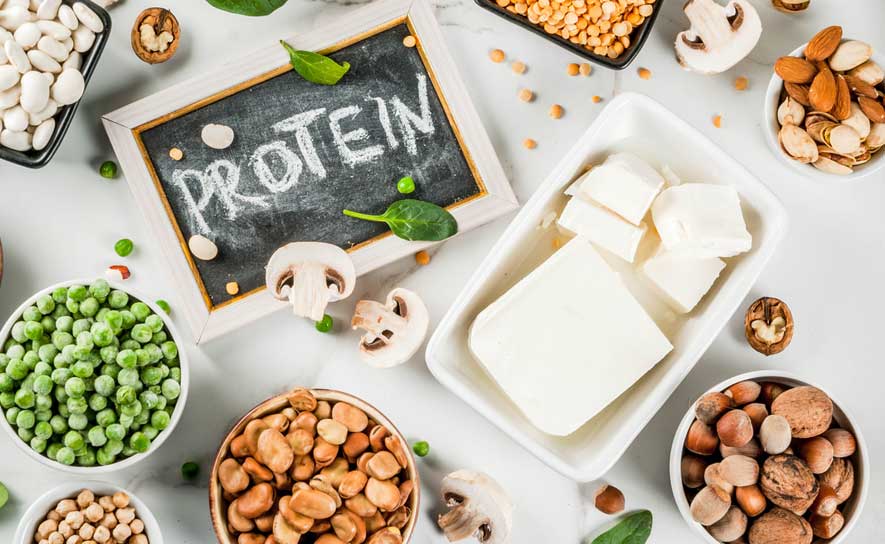USA Swimming News
Top Tips for Choosing Plant-based Proteins

by Chris Rosenbloom, PhD, RDN
It seems as though everyone has a heavy appetite for plant-based everything, and swimmers are no exception. A recent survey found that 70% of consumers view protein from plant sources as more healthful than protein from animals, but is that true? Swimmers who want to build, maintain, and repair muscle are often confused as to the best protein source because marketing for plant-based protein doesn’t always give the complete picture.
For years whey protein has been the gold standard for muscle protein synthesis (MPS). Most of you will recognize that whey protein, along with the protein casein, is found in milk and dairy foods. Whey has a high proportion of its protein content as the essential amino acid leucine, about 14%. Whey is described as the anabolic trigger for MPS because of the muscle’s ability to use this important amino acid. While the literature for whey protein, and other animal protein on MPS is robust, there is little research with plant-based proteins, except for soy.
Let’s look at plant-based proteins being touted for muscle protein synthesis and see how they stack up against animal proteins.
Soy protein contains all the essential amino acids (EAA) and promotes MPS, especially when compared to carbohydrate. Protein can be measured and given a score based on its digestibility and quality, that is, how well it is broken down in the GI tract and the proportion of amino acids, the building blocks of protein, it contains. That score is called the protein digestibility corrected amino acid score (or PDCAAS for short) and a score of 1.0 is the highest score that is given to a protein.
Soy protein isolate has a PDCAAS of 1.0, the same as milk and egg white, indicating high protein digestibility and quality. Soy protein is considered an intermediate-acting protein, compared to fast-acting whey. A fast-acting protein delivers amino acids rapidly after eaten, but an intermediate-acting protein delivers needed amino acids at a slower rate. Leucine content of soy is slightly lower than whey indicating that a slightly higher dose of soy is needed to equal that found in whey. Matching leucine and EAA, 40 g of soy is needed to provide 2.7 g leucine found in 25 g of whey. One persistent myth about soy protein is that it has a feminizing effect on males, but extensive research finds this assumption to be false.
Pea protein is derived from yellow peas and is used in plant-based bars and sports foods. It is low in the essential amino acid methionine but rich in arginine. When matching pea protein to whey, 38 grams of pea protein is needed to get the same amount of leucine in 25 grams of whey. It has a PDCAAS score of 0.73. Only one study to date has been published on pea protein vs whey protein measuring biceps thickness in young men. The men (untrained athletes) were given 25 g of pea, whey, or placebo twice a day for 12-weeks while undergoing strength training. Researchers found an increase in biceps muscle thickness in both the pea and whey protein groups compared to placebo. The conclusion was that pea protein is an effective source of amino acids needed to stimulate muscle protein synthesis.
Hemp protein is derived from hemp seed. It is fiber-rich yet lower in the key amino acids of leucine, lysine, and methionine than soy or pea protein. To match leucine content in 25 g of whey protein, 54 g of hemp protein is needed. While the manufacturers of hemp protein state that there is no risk of positive drug test using hemp protein, athletes should proceed with caution when using hemp protein or hemp seed oil.
While many believe that animal-based proteins are superior to plant-based proteins for muscle protein synthesis, that assumption may be premature because there is little research on plant proteins and muscle protein synthesis other than soy. A greater dose of plant-based protein might be needed, but consuming protein from plant sources can help build muscle in vegan athletes. With such a wide variability in amino acid content of plant-proteins, blends of different plant proteins may be the future for muscle protein synthesis for athletes.
For those interested in reviewing the research, check out these references:
Gorissen SHM et al. Protein content and amino acid composition of commercially available plant-based protein isolates. Amino Acids. 2018;50:1865-1695.
Candow DG, et al. Effect of whey and soy protein supplementation combined with resistance training in young adults. Int J Sport Nutr Exerc Metab. 2006;16:233-244.
Hughes GJ et al. Protein Digestibility-Corrected Amino Acid Scores (PDCAAS) for soy protein isolates and concentrates: criteria for evaluation. J Ag Food Chem. 2011:59:12707-12712.
Messina M. Soybean isoflavone exposure does not have feminizing effects on men: a critical examination of the clinical evidence. Fertil Steril. 2010; 93:2095-2104.
Babault N et al. Pea proteins oral supplementation promotes muscle thickness gains during resistance training: a double-blind, randomized, placebo-controlled trail vs whey protein. J Int Soc Sport Nutr. 2015;12:3-9.
Gorrisen SHM & Witard OC. Characterizing the muscle anabolic potential of dairy, meat and plant-based protein sources in older adults. Proceedings of the Nutrition Society. 2018;77:20-31.
